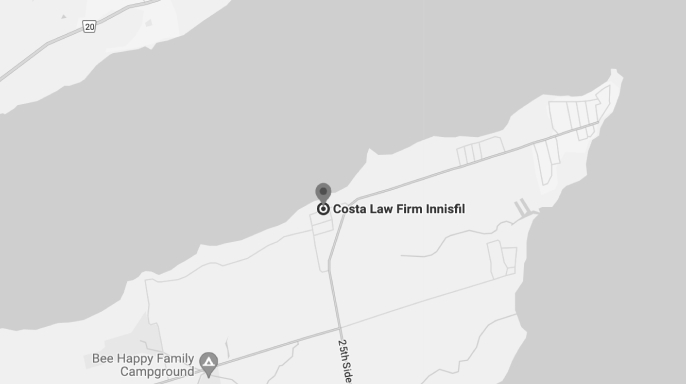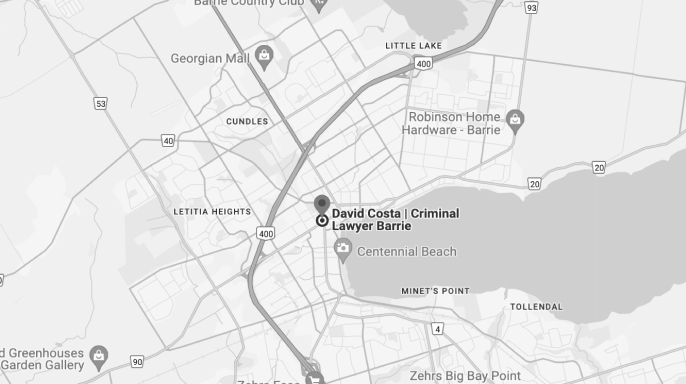Uttering Threats Lawyer Toronto
Most Canadians don’t know that their words or actions can be construed as threats. Your conduct and the words you speak sometimes arise out of hostility or anger. Perhaps you didn’t mean what you said and didn’t expect the other person to take them seriously. Unfortunately, your threats may be taken seriously, and when someone does, you may be charged with uttering threats.
Here at Costa Law, we have a team of experienced criminal defence lawyers. Our legal professionals have a wealth of criminal law knowledge and many years of experience handling cases involving uttering threats. Therefore, contact us and schedule a free, no-obligation consultation with our lawyers. We will discuss the details of your case and determine the best possible defence strategy.

What are Uttering Threats Charges?
The offence of uttering threats is covered under Section 264.1 of the Canadian Criminal Code. An individual may be found guilty of uttering threats if they knowingly utter, convey, or cause another person to feel threatened.
The threat in this context covers various actions, such as death or bodily harm to the other person. Also, it could be a threat to destroy, burn, or damage the real or personal property of the person being threatened, or it can be a threat to injure, kill, or poison a bird or another animal that belongs to the person to whom the threat is directed.
The Guilty Act
The prosecutor must prove the guilty act or actus reus beyond any reasonable doubt to get a conviction for uttering threats. This guilty act is that you (the accused person) knowingly conveyed or uttered a threat.
A ‘threat’ is legally interpreted as any message that endorses or encourages an ill will to befall the complainant. It is a determination to inflict injury or harm to another individual and is hostile. To determine whether one’s utterance constitutes a criminal threat, it must be assessed in the context in which the accused person spoke or wrote, in the light of the individual to whom the utterances were addressed, and the specific circumstances under which they were uttered.
Indeed, the utterances must be viewed objectively, and the meaning attributed to them must be that a reasonable person could give. Notably, the court must consider various factors to determine whether an utterance constitutes a threat under Section 234.1 of the Canadian Criminal Code. These factors include:
- The specific words spoken
- specific circumstances under which the words were spoken
- How (or the manner) in which the utterances were made
- The person to whom the words were addressed
- The person who spoke and their situation
The prosecutor can also prove the guilty act element if a reasonable person aware of all the circumstances would perceive the utterances as a threat of death or bodily harm. Typically, a reasonable person remains objective, in the right mind, fully informed, practical, realistic, and dispassionate.
The Guilty Mind
For the prosecutor to get you convicted for uttering threats, they should prove beyond reasonable doubt that you (the accused) intended to utter the words to intimidate and you wanted (intended) the utterances to be taken seriously. That’s all that’s needed to prove the guilty mind or mens reas element of this crime.
Thus, the Crown needs to show that the specific words you used were intended to have a threatening effect. In this case, the prosecutor needs to prove more than just recklessness to convict you for uttering a threat. Instead, they must prove a specific intent – demonstrate that the particular statement in question was made with real menace.
In some cases, the evidence of ‘intention’ isn’t apparent. The court must consider the means a reasonable individual would take from those utterances to determine the true intention of the accused person’s utterances. Thus, the judge or jury may sometimes rely on inferences to assess the intention of the accused (the person who uttered the threats).
Further, it’s irrelevant if you (the defendant) intended to carry out the uttered threats. The necessary mens rea (guilty mind) of the crime can still be proven by showing the threats were intended to intimidate the recipient. However, it would benefit the prosecution’s case against you if it could be proven that you fulfilled the threat. For instance, you did cause death or bodily harm to the complainant, their animal, or their property.
If police officers are investigating you for a criminal offence like uttering threats, we can help. All you need to do is contact us. Our lawyers have many years of experience helping people accused of uttering death threats navigate the criminal justice system.

Uttering Threats Defence Options
Suppose you are facing uttering threats charge. In that case, the availability and strength of an effective defence strategy depends on the unique facts of your case and the available evidence. Here are some of the defence options that may prove helpful when defending charges that involve uttering threats.
Inability to Reasonably Perceive the Utterances as Threats
To secure a conviction for uttering threats charge, the Crown must prove both the actus reus (guilty act) and mens rea (guilty mind) beyond a reasonable doubt. The context in which the words were spoken or written, considering the audience and circumstances, is pivotal.
The words must be objectively assessed, and if they wouldn’t reasonably be perceived as a threat by a reasonable person, the actus reus element isn’t satisfied. Demonstrating that the words wouldn’t alarm a reasonable individual aware of the situation can undermine the prosecution’s case, leading to an acquittal. That means the prosecutor will not obtain a conviction for the charges of uttering threats of death or bodily harm.
Lack of Intent
The mens rea or guilty mind element of the offence of uttering threats necessitates demonstrating that the accused intended for the words uttered to be taken seriously. If it can be proven that the threats were not intended to cause alarm or were made in jest, the mens rea requirement isn’t fulfilled. This will invalidate the uttering threats charge against you.
Instances where the accused was intoxicated, had a mental impairment or made the statement in a non-serious context, such as jest or hyperbole, can negate the intent element. For instance, utterances made jokingly or under the influence of substances may lack the requisite seriousness to constitute a threat of death or bodily harm in the eyes of the law.
Ambiguous Language
A viable defence against an uttering threats charge revolves around the ambiguity of the language used. If the words uttered can reasonably be interpreted in multiple ways, including non-threatening ones, it may not constitute a threat. For instance, phrases like “I’ll get you” in isolation lack specificity. They could be interpreted in many ways and may not amount to a threat of bodily harm or destruction of real or personal property.
By demonstrating that there’s a plausible alternative meaning to the actual words spoken, defendants can potentially refute the allegation of making threats. Remember, you need a knowledgeable lawyer with a deep understanding of Canadian law to defend you and protect your rights.
Identity Defense
In certain cases, challenging the accusation based on mistaken identity can serve as a valid defence against uttering threats charge. If you have been wrongly identified as the perpetrator, presenting evidence to establish your absence from the scene of the alleged offence is crucial. This may involve providing corroborative evidence such as an alibi to demonstrate that you couldn’t have committed the offense.
Work with our lawyers to prove that you were not present at the time the complainant was being threatened. It’s also possible to present evidence that casts doubt regarding your involvement in the offence of uttering threats.
Complainant’s Credibility
Questioning the credibility of the complainant can be a pivotal defence tactic, particularly in cases where threats were allegedly made in person without witnesses. If there are doubts regarding the truthfulness of the complainant’s account, it can cast uncertainty on the prosecution’s case.
In such instances, the court may need to rely on testimonies or make inferences to establish the sequence of events accurately. Gaps or inconsistencies in the complainant’s testimony can be highlighted to challenge the validity of their claims. This can create a reasonable doubt in the minds of the jury or judge.
Possible Charter Defenses
The Canadian Charter of Rights and Freedoms provides certain rights and protections to individuals, including those accused of uttering threats. If law enforcement authorities violate these rights, whether intentionally or unintentionally, it can significantly impact the case against the accused. Section 24(2) of the Charter allows for the exclusion of evidence obtained in violation of an individual’s Charter rights.
Therefore, if there has been a breach of your Charter rights before or after your arrest, you may be able to challenge the admissibility of evidence presented by the Crown. This could weaken the prosecution’s case and increase the likelihood of a favourable outcome for the accused.
Ultimately, our goal is to create a well-thought-out defence strategy aimed at achieving the best possible outcome in your case. We can achieve a favourable outcome through negotiation with the prosecution, seeking a dismissal of charges, or presenting a strong defence at trial. By working closely with our lawyers with knowledge of criminal defence, you can ensure that your defence strategy is strong and effectively executed.
Penalties for Uttering Threats Conviction
According to the Criminal Code, the sentence you get for a conviction of uttering threats will consider the unique circumstances of your case. The severity of the punishment will majorly depend on whether the prosecutor decides to proceed by indictment or summary conviction. Also, the presence of aggravating factors will affect the severity of the maximum penalty.
Suppose you have been convicted for uttering threats to cause death or bodily harm. If the prosecutor considers uttering threats an indictable offence, you face up to five years in jail. However, you face up to two years less a day in jail plus up to $5,000 fine on summary conviction. You probably notice the difference in penalty severity when a criminal charge is considered an indictable offence and when the same criminal charge is prosecuted summarily.
If you are found guilty of the criminal offence of uttering threats to cause death or bodily harm, there are sentence alternatives that may be available to you. These include fine alone, discharge, prison time and fine, prison time, intermitted sentence, and a combination of fine and probation. Also, a conditional sentence and a combination of probation and an intermitted sentence may be alternatives to custodial imprisonment.
If you have been convicted for uttering threats to injure an animal or bird or cause damage to personal property and the Crown opts to treat the crime as an indictable offence, you face a maximum of two years in jail. However, if the prosecutor proceeds with a summary conviction, you face a maximum penalty of two years less a day in prison and up to $,5000 in fine. Alternative sentencing options may also be available.
Other Consequences of a Conviction
Sure, there’s the sentence or jail time you are likely to receive after being found guilty of uttering threats. However, there are other ramifications of being convicted of crimes related to knowingly uttering a threat to damage property. These include:
Possible job loss: A conviction for uttering threats can lead to termination of employment, particularly in professions that require trust and integrity. Considering the conviction will appear in your criminal record, it may be challenging to land a new job.
Immigration issues: Conviction of uttering threats can complicate your immigration, permanent residence, and citizenship applications. This can potentially lead to denial of entry into the country or deportation.
Professional limitations: Individuals with a criminal record for uttering threats may face limitations in certain professions, jobs, and opportunities. This is because employers may be reluctant to hire someone with a history of violent behaviour.
Travel restrictions: A criminal record for uttering threats could result in being denied entry into the United States or other countries. This negatively affects your travel plans and opportunities.
Criminal record: Perhaps the most significant effect of being convicted of uttering threats will result in the acquisition of a criminal record. This record will be stored and accessible in the national Canadian Police Information Centre (CPIC) database. This can potentially affect future employment prospects, volunteer opportunities, housing applications, and other facets of life.
For individuals without prior criminal histories, the impact of a conviction for uttering threats can be profound, affecting their livelihood, freedom, and future opportunities. It is crucial to understand the seriousness of the offence and seek appropriate legal counsel to defend against the charges effectively. It is possible to get lesser sentences for first-time offenders.
The Role of an Experienced Criminal Defence Lawyer
A criminal lawyer specializing in uttering threats cases can provide invaluable assistance in several ways. These include:
Legal Skilfulness and Representation
A skilled defence lawyer from Costa Law has specialized knowledge and experience in handling uttering threats cases. We understand the nuances of the law, the burden of challenging the evidence presented by the prosecution, and the potential defences available to challenge the charges.
Our competent defence lawyer will advocate aggressively on your behalf in court, challenging the evidence presented by the prosecution, cross-examining witnesses, and presenting compelling arguments in your defence. Their goal is to undermine the case against you and protect your rights throughout the legal process.
Defence Strategy
Our lawyer will assess the circumstances surrounding your case, including the context of the alleged threat, any provocation involved, or potential mistaken identity. They will formulate a strategic defence tailored to the circumstances, aiming to introduce a reasonable doubt regarding your guilt and secure a favourable outcome.
Negotiation Skills
Your lawyer may engage in negotiations with the Crown prosecutor to seek a favourable resolution, such as having the charges dismissed, securing a plea deal with reduced consequences, or obtaining a peace bond as an alternative to prosecution. They will leverage their negotiation skills and understanding of the law to achieve the best possible outcome for you.
Peace Bond Application
In some cases, your lawyer may advise you to put in an application for a peace bond in case you have been charged with uttering threats. They can guide you through the process and represent your interests in court. However, whether the Crown attorney approves of this option depends on various factors, including the seriousness of the alleged threat and any extenuating circumstances, such as prior criminal history.
Generally, hiring a skilled criminal lawyer specializing in uttering threat charges is essential to protecting your rights, mounting a strong defence, and navigating the complexities of the legal system effectively. With our competence and advocacy, you stand a better chance of achieving a favourable outcome in your case.
Request A Consultation
Testimonials
What our clients are saying
Contact Us
Costa Law Firm
Costa Law Firm is a law firm located in Toronto with exceptional credentials that stands out for its commitment to client service. Our service minded approach has led Costa Law Firm to be one of the most reliable law firms in Toronto.
Address
Main Office:
1015 Bloor Street West, Toronto, Ontario M6H 1M1
Phone: (416) 535-6329
Fax: 416-535-4735
info@costalawfirm.ca
We provide emergency services for urgent matters.
Consultation Office:
17075 Leslie St Unit 6, Newmarket, ON L3Y 8E1Vaughan location 290 Caldari Rd Unit 8, Concord, ON L4K 4J4, CanadaBarrie location 49 High St 3rd floor, Barrie, ON L4N 5J4, Canada











